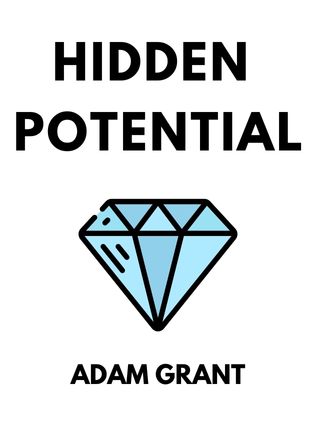
Hidden Potential
The Science of Achieving Greater Things
By Adam Grant
Published 10/2023
About the Author
Adam Grant is a renowned organizational psychologist, bestselling author, and professor at the Wharton School of the University of Pennsylvania. Recognized as one of the world's ten most influential management thinkers, Grant has also been listed among Fortune's 40 under 40. His work explores the psychology of success and the dynamics of interpersonal interactions. His engaging writing style and deep insights have made his books, including Give and Take, Originals, and Think Again, influential in both academic circles and mainstream business communities.
Main Idea
Hidden Potential: The Science of Achieving Greater Things delves into the intricacies of personal and collective growth, challenging the notion that innate talent is the sole determinant of success. Adam Grant proposes that potential is not a fixed attribute but a dynamic quality that can be cultivated through specific practices and mindsets. The book is structured into three parts, each focusing on different aspects of personal development: skills of character, the importance of scaffolding, and systems of opportunity. Through a combination of anecdotes, academic research, and practical advice, Grant provides a comprehensive guide to unlocking greater levels of achievement.
Table of Contents
- Introduction
- Skills of Character
- Structure for Motivation
- Systems of Opportunity
- Conclusion
Introduction
In the introduction, Adam Grant sets the stage by questioning the traditional views on talent and potential. He introduces the concept that potential is not a static trait but one that can be developed. The idea that "success is not about being the best but becoming better" encapsulates the essence of his message. He emphasizes the importance of adopting a growth mindset, where the focus is on learning and improvement rather than just innate ability.
Skills of Character
Understanding Character
Grant begins by defining character as "your capacity to prioritize your values over your instincts." He views character as a moldable trait, emphasizing that it’s not enough to know one’s values; living by them, especially in difficult times, is where character comes into play. He argues that character is crucial for navigating challenges and achieving long-term success.
Embracing Discomfort
Grant encourages readers to embrace discomfort as a means of growth. He believes that "the best way to accelerate growth is to embrace, seek, and amplify discomfort." This involves stepping out of one's comfort zone and willingly facing challenges. He discusses the myth of learning styles, asserting that while people have learning preferences, true growth often comes from abandoning these preferences and embracing new methods of learning.
"If you’re comfortable, you’re doin’ it wrong." - Adam Grant
Procrastination and Perfectionism
Grant challenges the common perception of procrastination as laziness, suggesting instead that it stems from a desire to avoid uncomfortable feelings associated with certain tasks. He also tackles the issue of perfectionism, demonstrating that it often leads to worse outcomes by causing individuals to focus on unimportant details, avoid new challenges, and harshly criticize themselves for mistakes. Instead, he advocates for setting realistic standards and adjusting them as necessary.
"Finding beauty in imperfection is often easier said than done." - Adam Grant
Developing Absorptive Capacity
Absorptive capacity is the ability to recognize, value, assimilate, and apply new information. Grant explains that effective learners are those who are both proactive and growth-oriented, constantly seeking improvement. He uses the metaphor of a sponge to describe individuals who are open to new experiences and eager to learn from them.
Overcoming Perfectionism
Grant identifies three main issues with perfectionism: focusing on unimportant details, avoiding situations where failure is possible, and being overly harsh on oneself for mistakes. He stresses the importance of creating achievable standards and adapting them over time, allowing room for growth and learning from mistakes.
Sign up for FREE and get access to 1,400+ books summaries.
You May Also Like
The Subtle Art of Not Giving a F*ck
A Counterintuitive Approach to Living a Good Life
By Mark MansonRich Dad Poor Dad
What the Rich Teach Their Kids About Money - That the Poor and Middle Class Do Not!
By Robert T. KiyosakiHow To Win Friends and Influence People
The All-Time Classic Manual Of People Skills
By Dale CarnegieFreakonomics
A Rogue Economist Explores the Hidden Side of Everything
By Steven D. Levitt and Stephen J. Dubner



















